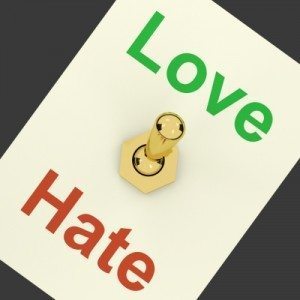Hate and Love in Relationships
Erik Mildes
Hate and love in relationships is a reality we all face at some time. Ecclesiastes 3:8a tells us that (there is) a time to love and a time to hate (NLT). Often times we think of hate as a “bad” feeling, we push it to the side trying to ignore it when it comes to the surface. Or we embrace it full force and allow it to plant a bitter seed in our hearts that grows and becomes poisonous. Both options make us slaves to hate, and keep us from experiencing real love.
Late one evening as I was about to wrap up a long day of counseling, I stumbled upon a truth that has eluded me for some time.
My client and I were working through feelings and memories about his dad. The previous Sunday my client told me about witnessing a baptism at church that really touched him. During the ceremony, the father’s pride for his young son was hugely apparent. As my client retold the father’s expression and his evident pride, it brought tears to his eyes. As we explored this account, we also found difficult reflections regarding broken parts in the relationship between my client and his dad.
Dad was a pastor and my client could not do anything right. Of course, he wanted his dad to be proud of him but never felt like he could measure up. Hard feelings developed because of this: anger, sadness, hurt and the most difficult one, hate. There are still strong feelings of that resemble loyalty and respect in my client for his dad, but what do you do with hate? Is it standing in the way of love?
Yes. The hate is standing in the way of love, but dismissing it without naming it in the context of my client’s relationship with his dad is not the answer. It actually furthers the harm done in the relationship and guarantees the disingenuous display of love and affection.
I have always been perplexed by what the Lord says through the prophet Malachi: “…The Lord said, “Esau and Jacob were brothers. I loved Jacob, but I hated Esau…” (Malachi 1:2-3)
How is it that God says that He is love (1 John 4:8) but he professes hatred? As contrary as it seems, hatred is not a disqualifier of love.
In Genesis, as Jacob returns to his homeland he finds Esau doing quite well. Even without the blessing of his father Isaac, God seems to have blessed him. Esau is in good spirits and accepts Jacob with open arms, forgiveness, and a kiss. This never made sense to me, until working through with my client’s feelings about his dad and considering what will be required for restoration.
Something played out between God and Esau in the time that Jacob was away. I imagine that not receiving the blessing that was rightfully his was a clear sign of God’s feelings towards him. Bitter anguish would probably start to describe it, yet when Jacob describes seeing Esau’s face upon meeting again, he describes it as “like seeing the face of God.”
It makes me wonder if Esau and God made up. It would require much humility on Esau’s part to ask for forgiveness and take part in mending his broken relationship with God. Even more so, without God revealing his hatred to him, Esau would not have known it needed mending.

In order for my client to move forward and truly love his father, they will have to deal with the hatred. If he doesn’t, their relationship will be based on falsity and in true, genuine love cannot exist. hate and love in relationships is a real challenge that people face, so it is important to address the feelings of hate and deal with them so that we can love completely.
When people do things that evoke hate, you are not wrong for feeling hate; hate is not a “bad” feeling. What you do with it, however, is important. Will you act spiteful or contemptuous? Or will you, out of love, put words to the breach in the relationship that needs to be mended?
The process to mend these broken parts of our relationships is not easy. Often times there are hurt feelings between parents and grown children or within marriages. How do you love if there is part of you that feels hate? Why do you feel hate? Were you hurt? Ridiculed? Disrespected?
This is often a process that cannot be done without help, especially in marriages where infidelity and affairs have occurred. It is not too late and definitely never too early to bring healing to your relationships. Reach out for help, especially from a qualified Christian counselor. We are here to help you journey and discover your feelings. We want to offer hope to your relationships. We want to see healing take place.
Images cc: freedigitalphotos.net




